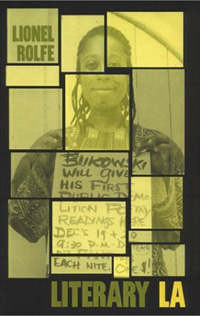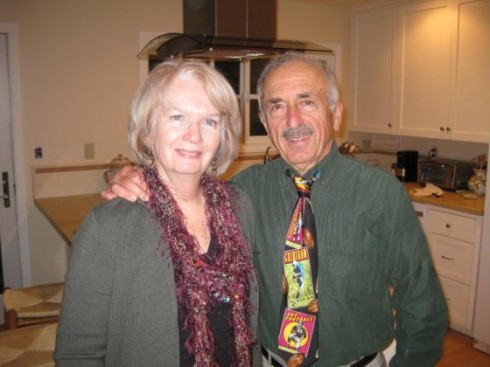Lionel Rolfe’s Literary LA Back in Print at Amazon.com
We are pleased to announce that Boryanabooks has brought back the expanded paperback edition of Lionel Rolfe’s Literary LA,
Now available in paperback from Amazon.com
 Los Angeles as a hotbed of writers, bohemians, mad poets, exiles and refugees from every form of political and emotional oppression surfaces again with the third edition of Literary LA. There has always been another side to the self-promotional glitter the city is best known for, and this book tells that story. Literary LA was originally published in 1981 by Chronicle Books in San Francisco. A revised edition, In Search of Literary LA, appeared ten years later. To mark the millennium, California Classics expanded the study, with new emphasis on the bohemian and apocalyptic streams in Los Angeles writing, and including additional chapters by John Ahouse and Julia Stein. This is the full text of that expanded edition, released under the imprint of Boryanabooks. Those who helped to weave this literary tapestry were, like many who take hold in Los Angeles, often transients, literary gypsies, bohemians and writers in imposed or self-imposed exile. Among the authors and book people discussed, frequently through the haze of one of the city’s coffeehouses, are Oscar Zeta Acosta, Charles Bukowski, Henry Miller, Ken Kesey, Carey McWilliams, Charles Lummis, Jacob Zeitlin, Louis Adamic, Nathanael West, Robinson Jeffers, Malcolm Lowry, Thomas and Heinrich Mann, Upton Sinclair, John Steinbeck, Aldous Huxley, Jack London, Theodore Dreiser, and many others. Journalist and author Lionel Rolfe grew up in European-influenced surroundings in Los Angeles. Through the early postwar years, his mother, the late pianist Yaltah Menuhin, hosted an at-home salon that offered a solace for musicians and other creative artists-in-exile. Much of what Rolfe writes has its roots in his own childhood impressions or the recollections of family members and visitors to his boyhood home.
Los Angeles as a hotbed of writers, bohemians, mad poets, exiles and refugees from every form of political and emotional oppression surfaces again with the third edition of Literary LA. There has always been another side to the self-promotional glitter the city is best known for, and this book tells that story. Literary LA was originally published in 1981 by Chronicle Books in San Francisco. A revised edition, In Search of Literary LA, appeared ten years later. To mark the millennium, California Classics expanded the study, with new emphasis on the bohemian and apocalyptic streams in Los Angeles writing, and including additional chapters by John Ahouse and Julia Stein. This is the full text of that expanded edition, released under the imprint of Boryanabooks. Those who helped to weave this literary tapestry were, like many who take hold in Los Angeles, often transients, literary gypsies, bohemians and writers in imposed or self-imposed exile. Among the authors and book people discussed, frequently through the haze of one of the city’s coffeehouses, are Oscar Zeta Acosta, Charles Bukowski, Henry Miller, Ken Kesey, Carey McWilliams, Charles Lummis, Jacob Zeitlin, Louis Adamic, Nathanael West, Robinson Jeffers, Malcolm Lowry, Thomas and Heinrich Mann, Upton Sinclair, John Steinbeck, Aldous Huxley, Jack London, Theodore Dreiser, and many others. Journalist and author Lionel Rolfe grew up in European-influenced surroundings in Los Angeles. Through the early postwar years, his mother, the late pianist Yaltah Menuhin, hosted an at-home salon that offered a solace for musicians and other creative artists-in-exile. Much of what Rolfe writes has its roots in his own childhood impressions or the recollections of family members and visitors to his boyhood home.
Iraq on Its Own Terms
Leslie Evans
The dominant American liberal narrative about Iraq is that George Bush lied to drag America into a pointless war that destroyed a stable, secular, if dictatorial, country at the cost of the lives of 4,486 U.S. military personnel and at least 120,000 Iraqis, possibly many more, costing a trillion dollars, and leaving behind a chaotic ruin riven by bloody sectarian rivalries headed into civil war. Marxists would add that the war was a predatory attempt by American imperialism to create a client state and take control of Iraq’s oil.
There is a certain amount of truth to these narratives but they are more about America than Iraq. Counting up the dead doesn’t tell you what the Iraqis in their various ethnic and religious groupings were themselves fighting for, whether they believe they were better off under Saddam Hussein or not, and tends to treat them as undifferentiated and passive pawns or victims of the United States and its coalition partners. Just maybe most of them don’t see it that way. Hate George Bush and Dick Cheney all you like. More power to you. The war was a disaster for America, and the Iraq that exists today is a far cry from the shining pro-West democracy that Bush and the neocons promised. But don’t lie to yourselves about the people of Iraq, either out of ignorance or out of hatred for the Bush administration. In any case, maybe the fact that Barack Obama was the Commander in Chief of the U.S. forces in Iraq for more than a third of the time they were there may lead you to consider that the war, ill considered or not, was not simply an attack on Iraq’s peoples. (Marxists excepted here.) Read more
ARTFULLY NEGOTIATING THE MARITAL TURF WARS
My friend Carla has a theory about long marriages. She claims that the relative success of a marriage is directly proportional to the square footage of the house in which the couple lives.
She maintains that her marriage to husband Don has lasted more than thirty years only because their house is big enough to accommodate separate spaces for portions of their days together. She tells him, “You stay on your side and I’ll stay on mine, and I’ll meet you in the kitchen for dinner at seven o’clock.”
Those of us who have known this couple for many years know that Carla possesses a rather wry and deadpan sense of humor. On their 30th anniversary, Don proposed a dinner toast to her, and said, “It doesn’t seem possible that thirty years could have passed so quickly.” She responded dryly, “Well honey, it doesn’t seem that long because you’ve been on the phone for most of that time.” Read more




